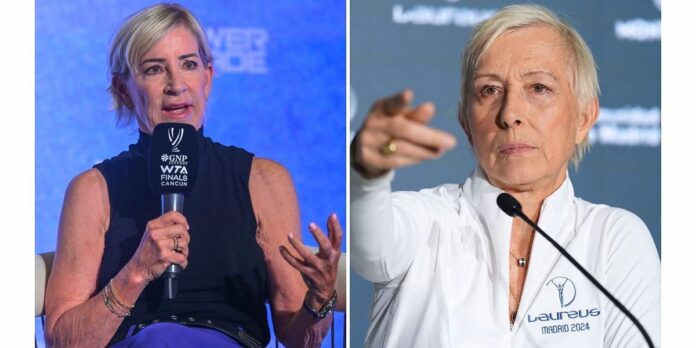Martina Navratilova once reflected on how the stark contrast in her and Chris Evert’s upbringings had an impact on the way they presented themselves during their tennis careers. While Evert was seen as the quintessential all-American girl next door, Navratilova was considered more volatile.
In her 1985 autobiography ‘Being Myself,’ Navratilova made the observation that American audiences weren’t comfortable with female athletes being outspoken or aggressive. She expressed her belief that such rigid gender stereotypes led to Evert being embraced, while players like her were criticized because they didn’t subscribe to the female roles expected of them.
“One thing I’ve noticed since I came to the States is that fans do not like female athletes to be outspoken and aggressive. A great competitor like Chris Evert is accepted because she doesn’t make waves on the court, but another great competitor — anybody you can name — is criticized because she opens her mouth. I’m convinced a lot of it has to do with sexual stereotyping by the public and the press, whether the players fill the female roles expected of them,” Martina Navratilova wrote.
Trending
When asked whether she still held that view during a 2018 appearance on the 'Conversations with Tyler' podcast, Martina Navratilova shared her revised opinion. Pointing out the influence of family dynamics, the former World No. 1 asserted that Chris Evert also conformed to traditional gender rules because of her strict Christian upbringing and a desire to please her parents.
"I think Chris was just conforming, not because of any preconceived ideas, but she came from a good Catholic family, and she wanted to please her parents. So it was more that than, I think, any American culture. It was actually more cultural within the family how you grew up," she added.
Navratilova has spoken about how she wanted to be more like Evert, whom she called the "perfect girl next door," because she craved the same adulation from crowds that her rival got. Nevertheless, the Czech-American acknowledged that the contrast between them only made their rivalry more compelling.
Martina Navratilova: "The one thing growing up in a Communist country was that it was OK to be a female athlete"

Martina Navratilova fled Czechoslovakia when she was just 18 years old, seeking political asylum in the USA to escape her homeland's Communist regime. She then became an American citizen in 1981.
However, the former World No. 1 could appreciate one thing about growing up in a Communist country, which was that women were encouraged to pursue any career path they chose. Navratilova made the revelation while explaining that she didn't grow up with the same gender stereotypes that Chris Evert had to navigate.
"The one thing growing up in a Communist country, perhaps the only good thing about it, was that it was OK to be a female athlete, or anything, really. There were women doctors, professors, very common. Not in the political scene — there was always guys, for some reason. But every other field, women were just as encouraged to go into that field as men," Navratilova said.
Martina Navratilova has also opened up about being portrayed as the "evil one" in her rivalry with Chris Evert, attributing this to "Slavic phobia." However, the legendary tennis rivals developed a close friendship despite their differences.
×

Urvi Mehra
Urvi is a journalist who covers tennis at Sportskeeda. She started playing tennis herself at age six when her favorite women’s player Maria Sharapova won the 2006 US Open. Over the years, her passion for the sport has grown, and so has her skill in analyzing and reporting it. Holding a Masters Degree in Literature has definitely helped in this.
Know More
Quick Links




